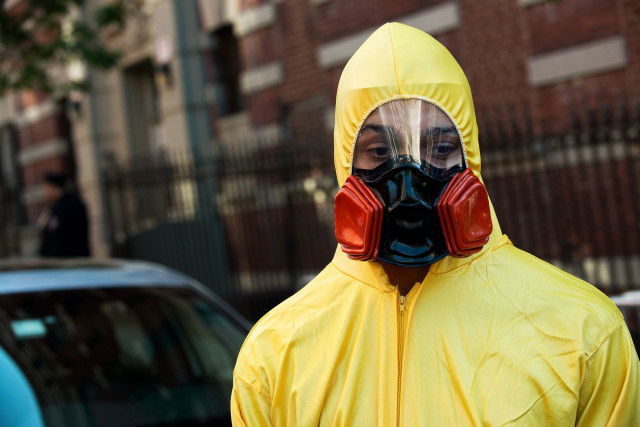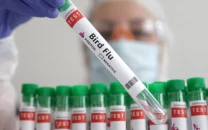Ebola preparation: Govt strategy does not meet necessary standards, says infectious disease expert
Highlights need to set up unattached isolation wards, problems with airport screening

Pakistan needs to think out-of-the-box while planning to deal with Ebola-affected persons as the current strategy chalked out by the federal government does not meet the necessary standards for the disease.
“The government should not follow the same guidelines for tackling Ebola which it is using to control other infectious disease like dengue fever and Congo fever, among others. It is because Ebola is highly contagious when compared to other diseases,” said an infectious disease control expert at the National Institute of Health (NIH) on the condition of anonymity.
Talking to The Express Tribune, the expert suggested that the government should avoid establishing Ebola patient isolation wards within the main buildings of hospitals, where there is mass movement of visitors, patients and medical staff.
“There is a need to understand the severity of the disease, risk factors involved in its spread and treatment. The government should establish two-three bed dedicated units for its patients far from the general wards”, he said.
The expert further expressed reservations over the screening procedure for early detection at airports.
“A passenger who has taken fever-reducing medication a few hours before landing at the airport would not be suspected of having the disease while being screened,” said the expert.
Preventive measures taken at federal level
In response to the possibility of Ebola entering the country, the Ministry of National Health Services, Regulation and Coordination (NHSRC) has held consultations with provincial governments had identified hospitals in which Ebola isolation wards would be set up.
These hospitals include Jinnah Hospital in Karachi, Services Hospital in Lahore, Fatima Jinnah Chest and General Hospital in Quetta, Hayatabad Medical Complex (HMC) Hospital in Peshawar, District Headquarter Hospital in Gilgit, Abbas Institute of Medical Sciences (AIMS) in Muzaffarabad, and Pakistan Institute of Medical Sciences (PIMS) in Islamabad.
Advisories have been issued by the Ministry of NHSRC and NIH regarding the measures to mitigate the threat of the virus to all the provincial and state chief secretaries and authorities concerned.
Information made available on the NIH website states that the body has the requisite expertise on sample collection, packing and transportation of any suspected specimen of Ebola to World Health Organisation (WHO) global laboratories. The WHO is providing free sample shipment services to its global laboratories.
Arrangements are being made so that immigration staff shares information with health officials on any passengers arriving from Ebola-effected countries.
Dengue Fever
The drop in temperature in the twin cities has also seen a significant decrease in the number of dengue patients arriving at hospitals.
Health experts fear that due to the drop in night temperature, dengue mosquitoes will try to look for a warmer place and could seek refugee inside houses. They have warned people to keep their windows and doors shut before sunset and take all precautionary measures to stop the mosquitoes from coming inside.
“Mosquitoes cannot survive once the temperature drops below 10 degrees Celsius, so they look for warmer places and usually go inside houses,” said Dr Najeeb Durrani, surveillance coordinator and Islamabad Capital Territory Dengue Control Cell in-charge.
He said that for the last week, there has been significant decrease in the number of patients coming to the capital for treatment.
“In the last week, 10 patients confirmed to have dengue fever came to hospitals in the capital. Earlier, it was around 30 in a week,” he said.
At least 81 patients have been treated in the capital this season, only 18 of whom were residents of the capital, Dr Durrani said.
Rawalpindi District Health Department Surveillance Officer Dr Eshan Ghani said eight new cases of dengue fever were reported on Saturday, taking the toll in the city to 829. When compared to previous months, however, there has been massive drop in the frequency of cases, he said.
Published in The Express Tribune, November 2nd, 2014.



















COMMENTS
Comments are moderated and generally will be posted if they are on-topic and not abusive.
For more information, please see our Comments FAQ